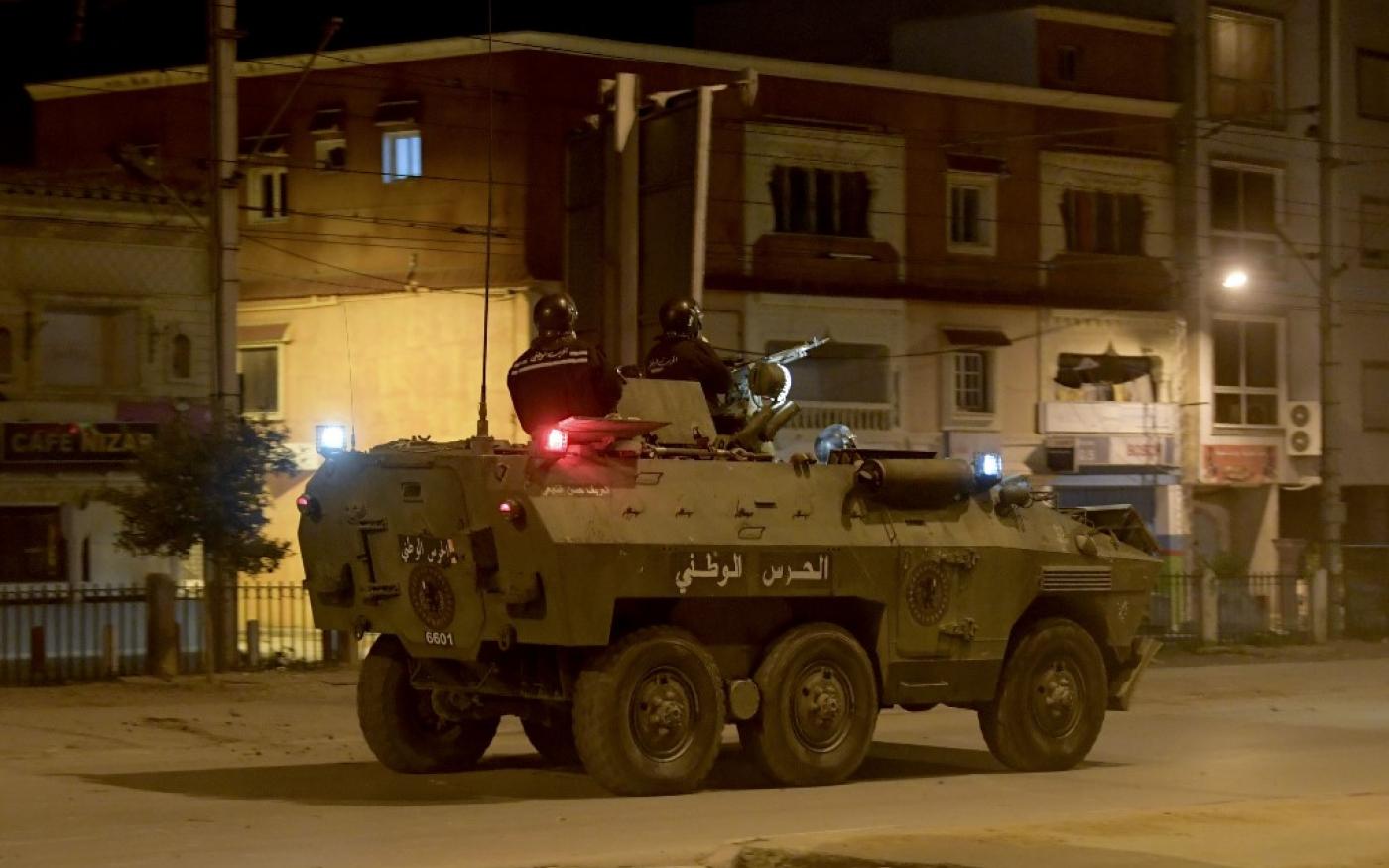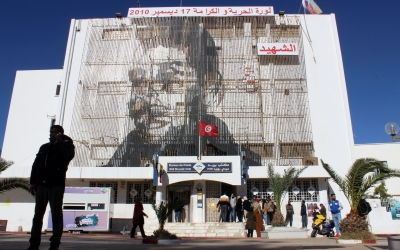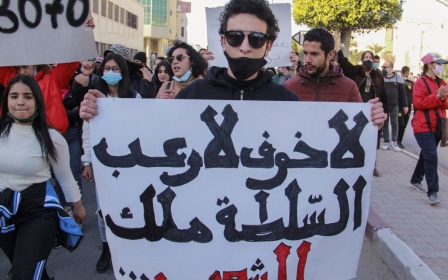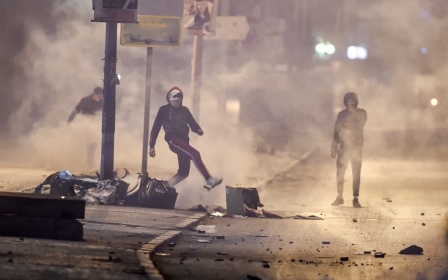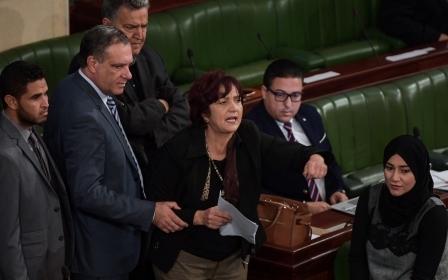Tunisia: This wave of violence is a political uprising
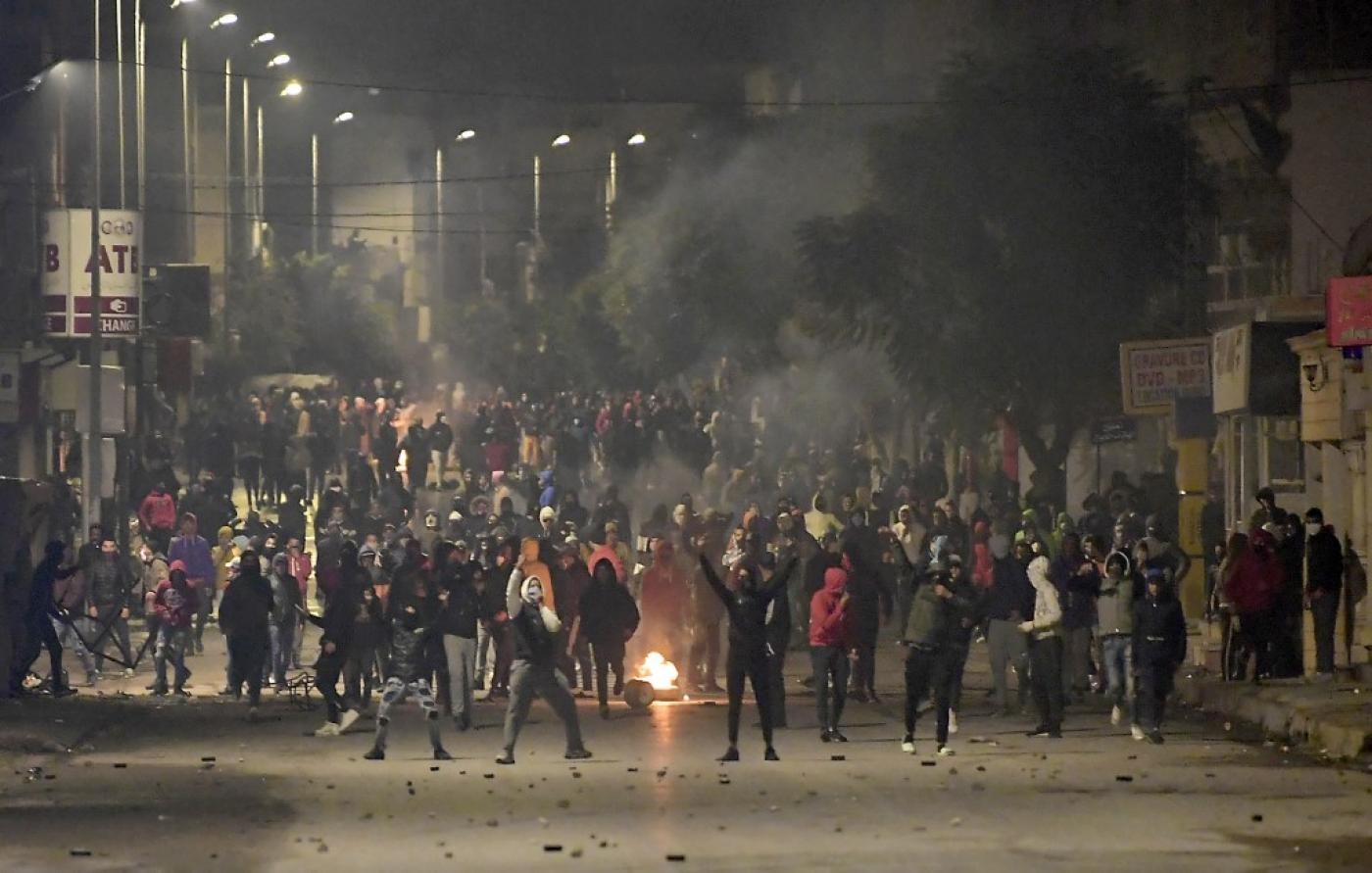
The working-class areas were invited to celebrate the tenth anniversary of the day former President Zine El Abidine Ben Ali fled, on 14 January, only to ignite the social unrest which had for months been billed as inevitable.
The government may have hoped to avoid the commemoration of the 2011 events becoming a spark in a powder keg by imposing a four-day, nationwide lockdown, of dubious public health efficacy, to run from Thursday 14 through Monday 18 January – wryly renamed the pont-finement (or long-weekend lockdown) on social media. If it did, then it failed.
Removing any validity from the protests is clearly a way of justifying the use of force and limiting sympathy for the victims
Instead of the usual dismal procession along Avenue Bourguiba in Tunis (scene of the final act of rebellion in front of the Interior Ministry), with tired clowns attempting to amuse the crowds after the parade of political organisations, a wave of nocturnal violence spread through the majority of towns nationwide.
Since Friday evening, clashes between the police and young people in working-class areas have spread like wildfire: burning tyres to barricade the streets, looting, damaging public buildings and banks and hurling rocks at police vehicles.
The police strategy seems for now to be to fan the flames. Protestors have been beaten, 632 arrests have been made, according to the Interior Ministry, including charges of "incitement to violence" on social media. Police have raided neighbourhoods with heavy use of tear gas and the army has been deployed in the governorates of Sousse, Kasserine, Siliana and Bizerte.
New MEE newsletter: Jerusalem Dispatch
Sign up to get the latest insights and analysis on Israel-Palestine, alongside Turkey Unpacked and other MEE newsletters
On Monday evening, National Guard armoured vehicles patrolled the streets of Hay Tadhamon, one of the biggest working-class areas on the outskirts of Tunis.
This response has also been reflected in the media: most commentators have broadly classified the violent outbreaks as petty crime and vandalism, citing the targets chosen and the young age of the protestors, the majority of whom are minors.
Anger rooted in corruption and poverty
Political or criminal? This question is always raised when there is social unrest without specific demands being made. Removing any validity from the protests is clearly a way of justifying the use of force and limiting sympathy for the victims.
It also allows organisations to monopolize discussions and historians to edit their vision to the higher segments of society.
On Saturday evening’s news broadcast, Walid Hakima, spokesperson of the Tunisian Public Safety Department, declared that “protest movements take place in daylight, in front of the government buildings”.
But, by their very nature, public uprisings are not neatly organised in line with legally defined categories. The fact that an act may incur criminal charges does not necessarily preclude it from having political significance. Yet, in this present movement, it is blindingly obvious that this is what is happening.
First and foremost on the basis of causality. The areas most affected by the lockdown are on the towns’ outskirts where the grey economy and precarious, unprotected work constitute the principal sources of revenue.
In this survival economy, theft tends to constitute the fallback option. A new lockdown, even a short-term one, and a more stringent curfew further exacerbate these problems.
Under conditions such as these, historically strained relations between the police and young people in working class suburbs can only deteriorate.
The police response to the protests by young Club Africain supporters, the previous week, have added to the discontent.
The political class has been powerless for ten years to keep the promises of equality, probity and dignity of the revolution, adding to mistrust of the state and to the loss of confidence in representative institutions.
The "people", that part of society that institutional ‘representation’ is not representing, are here sending a timely reminder to their leaders.
In their respective press releases, the Tunisian General Labour Union (UGTT), the Tunisian Forum for Social and Economic Rights (FTDES) and the Tunisian Association of Young Lawyers (ATJA) also underline the culpability of successive governments since 2011 in the deterioration of the social situation, the aggravation of corruption and the “hijacking of the revolution to the profit of the lobbies” (ATJA).
The UGTT considers that “settling for repressive solutions and propelling the security and military forces into confrontation with the public is an ineffective and unproductive method of solving the problems of hundreds of thousands of marginalised youth”.
The union also called on the protestors to stop the looting, the attacks on property and the overnight protests due to the risk of infiltration by extreme factions and the potential for excesses.
The ATJA called on the national organisations and all stakeholders to coordinate immediately and urgently to lead the protests and realign their objectives.
In reality, these demonstrations underline the failure of the organisations charged with taking the objectives of the revolution forwards and getting these same objectives over the finishing line as public policy. Nor do these organisations acknowledge the frustrations of the people and exasperated youths any better than the authorities do.
The revolution of the hungry
The movement is also political in its modality. The coincidence of the nationwide outbreaks of unrest and the similarity of the targets show that despite the absence of any overarching structure, a whole segment of the population shares the same experience, the same adversities, the same understanding of justice and injustice.
This inherent consciousness is not just the projection of lowly, materialistic motivations onto the actions of protesters. “This is the revolution of the hungry” reads the slogan painted on a wall in Kabbariya, a neighbourhood in the southern suburbs of Tunis.
Although their attacks may not target the "seats of government", for the protestors there is a significance more important than their function: the looting of shops where the “spoils” turn out to be basic foodstuffs and essential items highlights the ongoing struggle to meet primary needs.
'You want us to stay unemployed? Soon we’ll be eating scrap metal! Soon we’ll be eating each other!”, shouted a young protestor in Zahrouni, not far from Tunis
But these attacks also target those who are seen to have profited while the population grows poorer. One could even moot the hypothesis that the Aziza conveniences stores, prevalent in the working-class neighbourhoods, have been particularly targeted because of their notoriously close links the Ennahda party, and its close links to power (it constitutes the primary force within parliament).
Even the “looting" has overtones of a cry aimed at those responsible: “You want us to stay unemployed? Soon we’ll be eating scrap metal! Soon we’ll be eating each other!”, shouted a young protestor in Zahrouni, not far from Tunis, interviewed on Sunday by the reporter from Tunisie Info, an on-line video channel.
As for the bank branches and post offices, their presence in neighbourhoods where neither saving nor borrowing are an option resonates as provocative. The political meaning of the clashes with police, the sovereign institution that it is, is self-explanatory.
‘The people are taking back their revolution’
The deafness of the government and the severity of the crackdown make the explicitly political content of the protests all the more categorical.
"It’s a continuation of 2010 and 2011, because nothing has changed, the powers that be have made people poorer and more marginalised in regions. Before, there was a problem with the corrupt family of Ben Ali. Now there is a problem with the new family in power, the Ennahda family and the corrupt business clans, the same ones as before, nothing has even changed!" raged a visibly politicised protestor from Jelma, a rural town in the centre of the country.
If the message for the political class may come across as one of defiance, President Kais Saied, who owes his election in great part to this marginalised section of society, interprets it as a call, but it is a call that has been met with inaction and silence, leading to incomprehension and an increasing sense of betrayal.
“I have a message for the president,” said the protestor interviewed in Zahrouni. “Wake up, you were elected by the people, you really need to wake up, Mr President!”
On Monday afternoon, the head of state went to meet the population in Mnihla, west of Tunis, where he declared, in the middle of a crowd: "I know that the young people are besieged by poverty. But I want you not to attack anyone, nor to attack property and institutions. You have the right to express yourself, but I want you to teach the world a lesson. We are not a people who act in the dark, there are people who want to use you at night! Don't let yourself be used. On the contrary, be those who protect the institutions," before one of the members of the audience calls out: "Mr President, suppress the political parties! They are the ones who ruined the country!” And the group chants: "Dissolve parliament!”
The anger accumulated over a ten-year period has shifted from the presidency toward parliament - which was meant to embody democracy and ultimately has come to symbolise its corruption.
On Monday at midday, there were clashes near to the centre of the capital between protestors and law enforcement, with shouts directed at the prime minister: “Mechichi, sell-out, call off your dogs and stand down!” and “Martyrs, it’s time for another revolution!”
The opinions expressed in this article are the author’s own and do not necessarily reflect the editorial policy of Middle East Eye.
This article originally appeared in the French edition of Middle East Eye.
Middle East Eye delivers independent and unrivalled coverage and analysis of the Middle East, North Africa and beyond. To learn more about republishing this content and the associated fees, please fill out this form. More about MEE can be found here.



